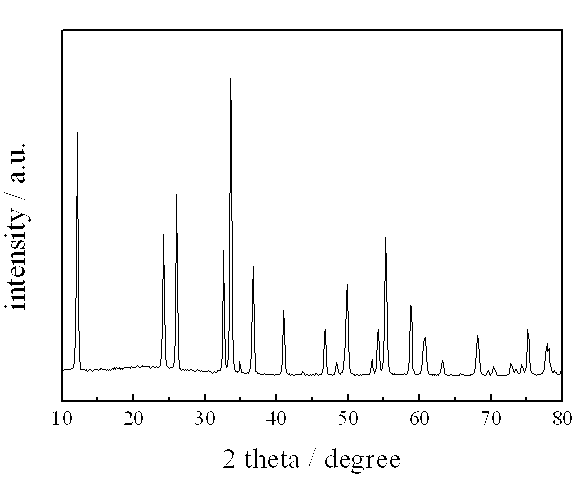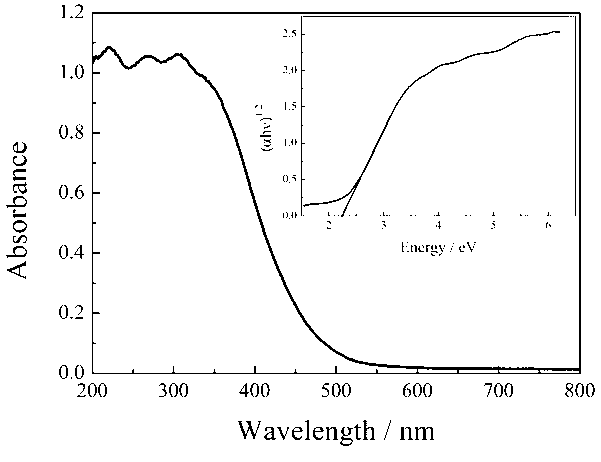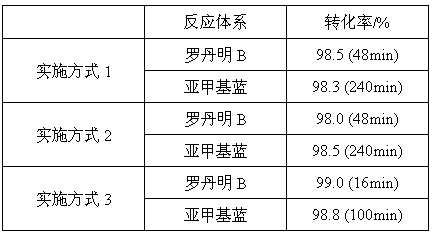Preparation method and application method of visible-light response type bismuth oxychloride photocatalyst
A technology of photocatalyst and bismuth oxychloride, applied in chemical instruments and methods, physical/chemical process catalysts, bismuth compounds, etc., can solve pollution and other problems, achieve environmental friendliness, mild preparation conditions, and increase utilization efficiency
- Summary
- Abstract
- Description
- Claims
- Application Information
AI Technical Summary
Problems solved by technology
Method used
Image
Examples
Embodiment approach 1
[0020] Weigh 3.16 g of sodium bismuthate and disperse it in 40 mL of absolute ethanol. Prepare 1.2 molL -1 Dilute hydrochloric acid 40 mL, weigh potassium iodide in an equimolar amount to the chloride ion in the prepared hydrochloric acid solution and dissolve in the hydrochloric acid to form a hydrochloric acid-potassium iodide mixed solution, and add the mixed solution to sodium bismuthate-sodium bismuthate- In the absolute ethanol suspension, the suspension solution was obtained after stirring for 1.5 h. The suspension solution was filtered with suction, and the filter cake was washed three times with distilled water and absolute ethanol, and then dried at 40 °C to obtain a visible light-responsive BiOCl photocatalyst.
[0021] The obtained photocatalyst is used for oxidation treatment of rhodamine B or methylene blue aqueous solution. The degradation steps are:
[0022] Step (1): Accurately weigh 7 mg of rhodamine B or methylene blue solid, dissolve it in distilled wate...
Embodiment approach 2
[0026] Weigh 6.32 g of sodium bismuthate and disperse it in 80 mL of absolute ethanol. Prepare 1.2 molL -1 Dilute hydrochloric acid 80 mL, weigh potassium iodide in an equimolar amount to the chloride ion in the prepared hydrochloric acid solution and dissolve it in the hydrochloric acid to form a hydrochloric acid-potassium iodide mixed solution, and add the mixed solution to sodium bismuthate-sodium bismuthate- In the absolute ethanol suspension, the suspension solution was obtained after stirring for 2 h. The suspension solution was filtered with suction, and the filter cake was washed three times with distilled water and absolute ethanol, and then dried at 50 °C to obtain a visible light-responsive BiOCl photocatalyst.
[0027] The obtained photocatalyst is used for oxidation treatment of rhodamine B or methylene blue aqueous solution. The degradation steps are:
[0028] Step (1): Accurately weigh 7 mg of rhodamine B or methylene blue solid, dissolve it in distilled wat...
Embodiment approach 3
[0032] Weigh 1.58 g of sodium bismuthate and disperse it in 20 mL of absolute ethanol. Prepare 1.2 molL -1 Dilute hydrochloric acid 20 mL, weigh potassium iodide in an equimolar amount to the chloride ion in the prepared hydrochloric acid solution and dissolve in the hydrochloric acid to form a hydrochloric acid-potassium iodide mixed solution, and add the mixed solution to sodium bismuthate-sodium bismuthate- In the absolute ethanol suspension, the suspension solution was obtained after stirring for 1.5 h. The suspension solution was filtered with suction, and the filter cake was washed three times with distilled water and absolute ethanol, and then dried at 45°C to obtain a visible light-responsive BiOCl photocatalyst.
[0033] The obtained photocatalyst is used for oxidation treatment of rhodamine B or methylene blue aqueous solution. The degradation steps are:
[0034] Step (1): Accurately weigh 7 mg of rhodamine B or methylene blue solid, dissolve it in distilled water...
PUM
 Login to View More
Login to View More Abstract
Description
Claims
Application Information
 Login to View More
Login to View More - Generate Ideas
- Intellectual Property
- Life Sciences
- Materials
- Tech Scout
- Unparalleled Data Quality
- Higher Quality Content
- 60% Fewer Hallucinations
Browse by: Latest US Patents, China's latest patents, Technical Efficacy Thesaurus, Application Domain, Technology Topic, Popular Technical Reports.
© 2025 PatSnap. All rights reserved.Legal|Privacy policy|Modern Slavery Act Transparency Statement|Sitemap|About US| Contact US: help@patsnap.com



